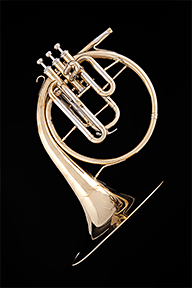By Cara Dublin
In 1991, Joseph Rivers, professor of music and film studies at the University of Tulsa, thought that the Phi Beta Kappa initiation ceremony performed at the University of Tulsa needed something to set it off, something to lend it greater presence, in keeping with the Society’s storied history. While talking with some colleagues, Rivers was inspired by the idea of having a more regal and more festive character to the occasion and sought to compose a processional uniquely suited to ΦBK. The result was Marche Academique, an original work for brass quintet.
Every year, some time prior to the initiation in May, Rivers sends out a request for students or faculty who can comprise the brass quintet. Initially, the quintets were composed mainly of faculty, but over the last twenty-one years the ensemble has increasingly tended to be either completely students or made up of mostly students.
“I composed Marche Academique for a brass quintet because I thought that was practical,” Rivers said. Most universities or colleges with a music department can easily assemble the requisite players, and, he added, “even a school with only a marching band… can likely find a brass quintet,” an ensemble composed of two trumpets, a French horn, a trombone, and a tuba.
“Brass gives a nice, regal effect to a ceremony,” Rivers said. “To have a brass quintet really sounds like something special.” The addition of music can transform a set of motions into something “a lot happier and more full of life,” Rivers reflected, and also into something “more formal, more joyous, and more memorable.”
“That’s why music accompanies so many ceremonies,” Rivers said. Music can really crystallize and elevate “all the various nuances possible for a ceremony” into one experience, he explained.
Marche Academique acquired its French name primarily because Rivers associated Academia with the University of Paris, the setting for the beginning of the modern university in the twelfth century. He hoped to call to mind those early associations with the academic tradition. Additionally, “the piece seemed to have a French feel to it, in the tradition of maybe Fauré or Ravel,” Rivers commented, “though I was not necessarily trying for that.”
When composing Marche Academique, Rivers also sought to follow in the footsteps of many canonical greats of the music world who wrote marches to mark significant events. He created a piece unique to his style and the occasion but worthy of the musical and academic history it continues.
“Each brass instrument has an interesting part to play,” Rivers said. In fact, at some point during the work, “every instrument has a chance to play the melody. I even gave the tuba the chance to play,” he added. Marche Academique therefore can stand alone, Rivers said, “as a nice musical piece if it were played for something else, but it was specifically written to be performed for Phi Beta Kappa – our chapter, and any chapter that wants to use it.”
In January 2013, the piece made what Rivers hopes is the first of many journeys off of Tulsa’s campus and was played by a student quintet as the processional for the installation of the Gamma of Oklahoma chapter at Oklahoma State University. In 2012, the University of Tulsa administration, having heard March Academique at ΦBK initiations for years, further expanded the piece’s potential scope when it requested a version scored for full orchestra. River’s expanded setting was played by the University of Tulsa Orchestra for the university’s December graduation as a recessional, mirroring Edward Elgar’s famous processional Pomp and Circumstance as a grand and rousing bookend to a meaningful academic ceremony. Rivers expects that Tulsa will continue to use his work in this manner.
To continue and expand Marche Acedemique’s history, Rivers has made the score available to all ΦBK chapters nationwide as a free PDF available upon request. “We sincerely hope that more chapters will be interested in using it” to enrich their ΦBK events, Rivers said. “I think the possibility is for the piece also to have its own tradition,” Rivers said, “as well as a tradition as something unique to Phi Beta Kappa.” The first twenty-one years are only the beginning of Marche Academique’s legacy for Phi Beta Kappans.
A sample recording and River’s contact information may be found on the chapter website for Beta of Oklahoma, University of Tulsa.

Above: Peter Rivers, professor of music and film at the University of Tulsa.
Cara Dublin is a senior at the University of Tulsa double majoring in history and English. The University of Tulsa is home to the Beta of Oklahoma chapter of Phi Beta Kappa.




